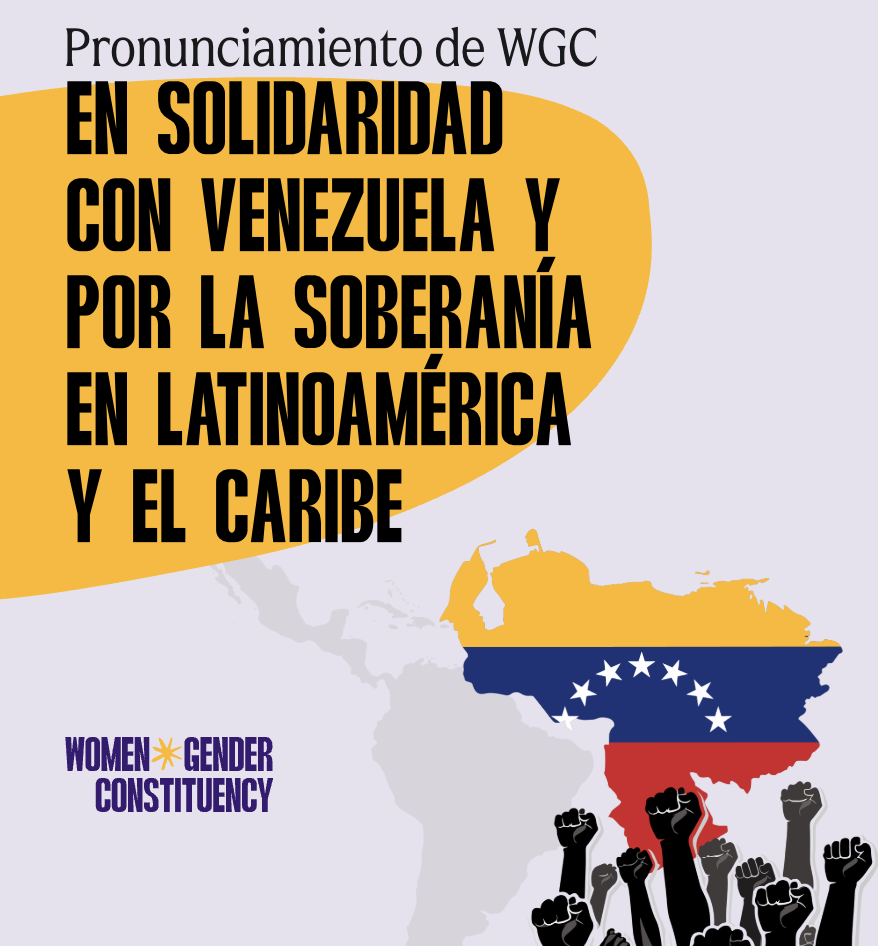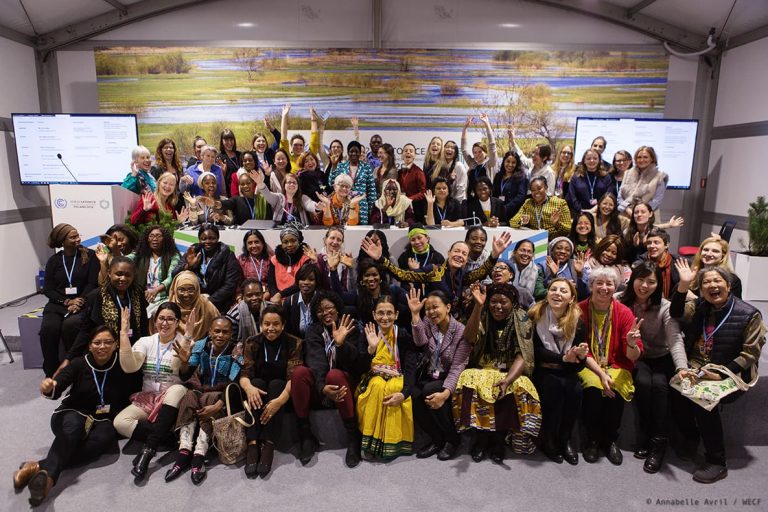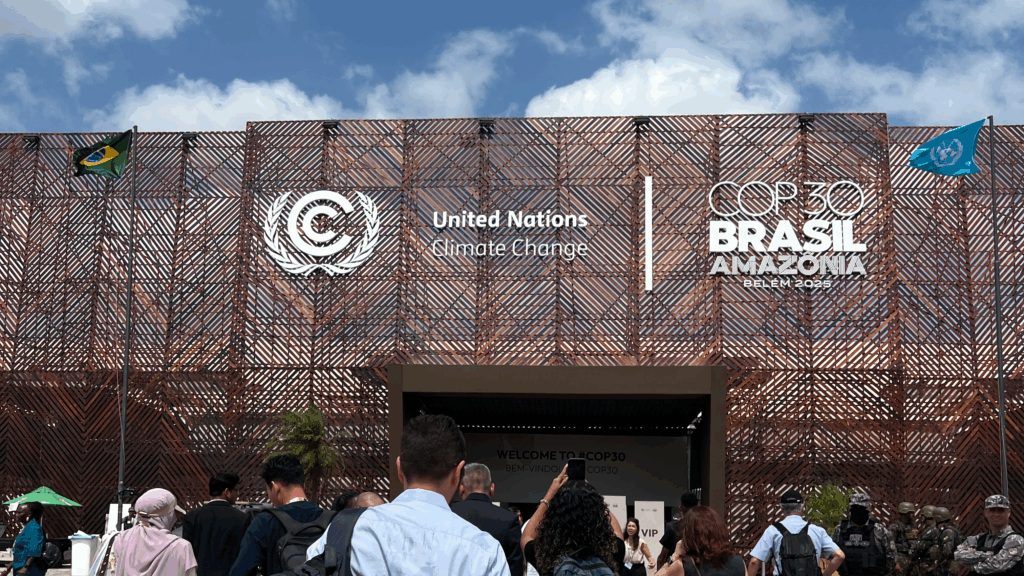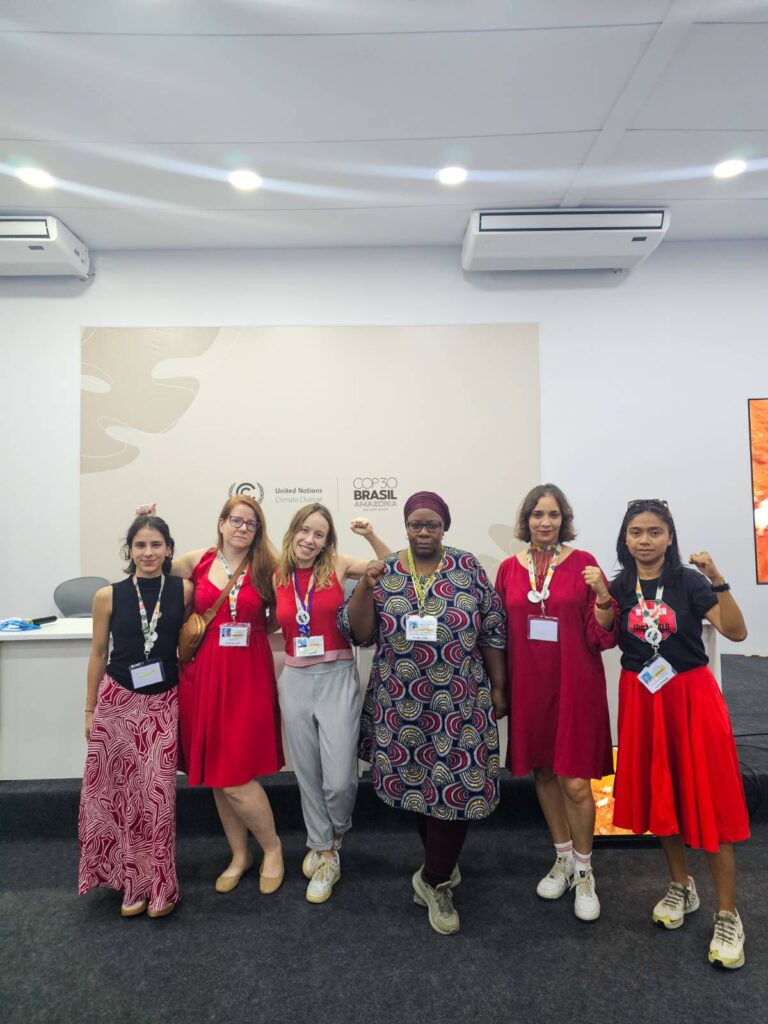
Feminist Solidarity for a Healthy Planet: Joining Calls to Postpone COP26

The world we want – centered on care for people and planet – does not pit climate action against global health – it fosters ecosystems that work for all.
Monday, 13 September: Today, as feminists from around the world – including members of the Women and Gender Constituency to the UNFCCC and its diverse advocacy network, made up of over 600 women’s rights and feminist organizations and activists – we join our allies in delivering a reality check to developed countries, including the UK COP Presidency: failure to lead in an equitable response to the COVID pandemic, compounding deep inequities already faced by many around the world, has fueled a global health crisis and created an unsafe environment for hosting large-scale “in-person” decision-making gatherings such as COP26. With our partners, we call for a postponement of COP26 until such time when safe and inclusive participation of all is possible.
As global feminists, we are well-versed in fighting multiple and intersecting forms of oppression and structural barriers – and we understand how systems work to maintain and reproduce inequalities. It leads to a world that allows developed countries to hoard supplies of COVID-19 vaccines while mandating COVID-19 booster shots for parts of their vulnerable populations, while the majority of the world, including a majority of African countries, struggles to reach a goal of 10% coverage by this month, let alone 40% by the end of the year. It’s a world where rich countries favour corporate capture and allow pharmaceutical companies to profit over vaccine inequity and refuse to advance the World Trade Organization Trade-Related Aspects of Intellectual Property Rights (WTO TRIPS) waiver which is supported by over 100 countries.
It’s a world where those countries and people who have contributed the least to driving climate change are experiencing the impacts of the climate crisis first and worst.
It’s a world where 100 fossil fuel companies are responsible for over 71% of the world’s greenhouse gas emissions, and are rewarded with government support, perverse subsidies and a vast portion of the world’s wealth, while Indigenous Peoples conserve more than 30% of the world’s land, and yet, face increasing rates of violence as land and water defenders have to fight for protection of their universally designated rights to sovereignty.
So it is not surprising that we find ourselves in the midst of a global health pandemic – where the same countries who could and should have ensured equity across all countries in access to vaccines, are now purporting that “momentum for climate action” is predicated upon an “in-person” gathering in Glasgow, Scotland.
We believe in the power of multilateralism, and in the importance of gathering in spaces to foster global collaboration and agreements. We are also well aware of the vital importance these spaces play for countries and observers, particularly from the Global South, as these are platforms to leverage collective power and make demands to developed country Governments to meet the obligations of our global commitments to climate, environment, human rights, peace and justice overall. These spaces continue to be crucial.
However, we refuse to ignore the reality of these times. Over 223 million people have been confirmed as infected with COVID-19 and over 4 million people have died (as of September 2021, WHO). Numerous challenges, from travel restrictions, transit issues, to visas, particularly from “Red List” countries, and extremely high costs of accommodation, plus uncertainty about safety measures, quarantine, and daily screenings in Glasgow would pose challenges to equitable participation at any COP, and in 2021, are intractable. Fundamentally, we are deeply concerned about the implications of hosting this event at the scale required to ensure full participation and inclusion- for the overall health and safety of both individuals attending, as well as for communities back home that will face the risk of a possible transmission of the virus and its new variants including the highly transmissible Delta variant, when individuals return to their home countries.
Women, in all their diversity, are caregivers, environmental stewards and workers (paid and unpaid). Their situations, especially for women in the Global South, are further- exacerbated due to the climate and ecological emergency. During this pandemic, women are at the forefront of providing the majority of paid and unpaid care, domestic, communal work and support while sacrificing their mental health and facing jobs and income loss. This pandemic exposes the increasing health and safety risks, violence, poverty, disproportionate workload and food insecurity faced by women. This is exacerbated by exponential crippling debt rise in this COVID19 period, with developing country governments taking out further unaffordable loans from international financial institutions and industrialised countries that they cannot afford. Global inequality and social injustices are driving the climate and COVID crisis with women in the Global South and from Indigenous, racialised and marginalised communities in the Global North bearing the hardest impacts.
The expectation that these women have an equal opportunity to suspend and hand off their care responsibilities, access vaccines, afford visas, journeys often with multiple transits, accommodation and expenses in the UK at a time when the pandemic is surging is the result of a deliberate ignorance of the power and privilege imbalance deeply entrenched in coloniality and imperialism. A COP which leads to the exclusion and silencing of civil society, especially women, LGBTQI+ people and youth in all their diversity, particularly from the Global South, fails the promises of Paris and sets an unacceptable standard for inclusive global cooperation.
The UK COP Presidency has had more than a year to plan, organize and prepare for COP26. While noting the many challenges of doing so in our current context, we feel the complete insistence of an “in-person” gathering in the absence of true leadership in its G7 Presidency to deliver on vaccine and debt equity, or the preparation of alternative scenarios for advancing key issues on the negotiating table that would prioritize health, safety and inclusion, has created a situation where COP26 should not proceed in November as planned.
Importantly, a demand for investing in global health must not be pitted against climate action. Climate justice is predicated on gender justice, disability/health justice and racial justice. In fact, as the WGC, we stress the urgency for countries to move forward with the following priorities regardless of whether a COP happens in-person in Glasgow later this year:
- Implement and support the immediate phase out of fossil fuels, including prohibiting new permits and leases for fossil fuel companies, and reject false solutions such as nuclear, bioenergy with carbon capture and storage (BECCs), and carbon markets, and commit to large scale investments in care, and regenerative, sustainable energy solutions that do not imply a massive increase in mineral extraction (incl. renewable energy, energy efficiency, and local solutions which also serve other SDGs like ending poverty and gender equality);
- Uphold the rights of Indigenous Peoples as enshrined in the United Nations Declaration on the Rights of Indigenous Peoples and respect and implement the principle of Free, Prior and Informed Consent (FPIC);
- Advance the World Trade Organization Trade-Related Aspects of Intellectual Property Rights (WTO TRIPS) waiver, supported by over 100 countries, contribute adequate vaccines to the COVAX Facility, and share technological know-how through the World Health Organization’s Covid-19 Technology Access Pool (CTAP);
- Ensure that economic policy measures for post-COVID response are just, climate-compatible and prioritize support for the well-being of all people, and especially the most marginalized and at risk over corporate bailouts, including through the protection and expansion of social support systems;
- Raise the quantity and quality of climate finance overall to achieve, at minimum, the US$100 billion goal, ensuring finance is gender-responsive, and that the proportion of grant funding for adaptation is increased, as a matter of climate and social justice and in light of the debt crisis in developing countries (SIDS and LDCs) worst affected by climate change;
- Establish a sovereign debt workout mechanism under the auspices of the United Nations which can support states in restructuring or canceling their debts in an equitable manner with all creditors;
- Provide financing for loss and damage that is new and additional to still unfulfilled climate finance commitments made by developed countries, including the US$100 billion goal;
- Ensure and enhance direct access to adequate financing for community, youth, feminist and women’s rights organizations and movements who adequately respond to the needs of their communities, and not only governments and UN agencies.
A call for the postponement of COP26 is not a call for the postponement of timely, ambitious and just climate action. Protecting people, other species and the planet must be central to everyday decision-making to respond to the science of climate change and ensure a healthy environment for all. As feminists, and advocates for a just and healthy planet, we will continue to raise our voices and build movements for real change across all spaces, in our homes, communities and at national and global level. Our momentum for climate justice will remain determined and undaunted – as all true commitment to action must.
——————————
MEDIA CONTACTS
Patricia Bohland – Bohland@life-online.de
Kavita Naidu – kavnaidu82@gmail.com
SUPPORTING STATEMENTS
Calls for solidarity, vaccine equity and postponement

